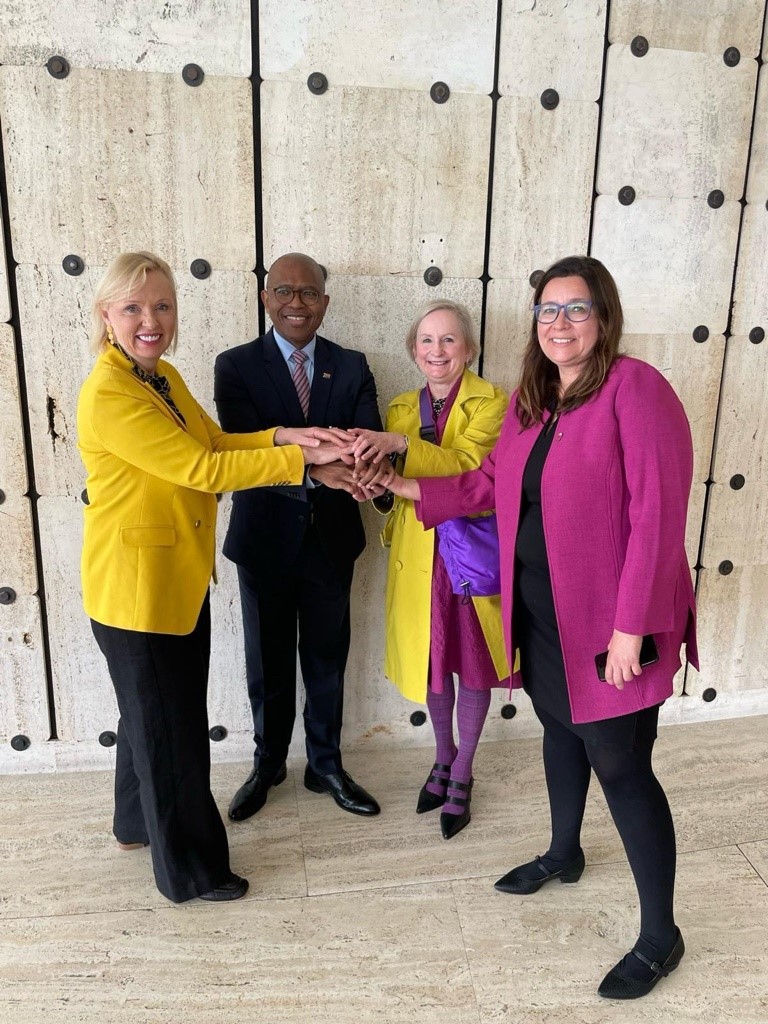Vice-presidency of Human Rights Council offers Finland opportunity to advocate international cooperation
Finland’s membership of the UN Human Rights Council continues until the end of 2024. This year, Ambassador Heidi Schroderus-Fox, Permanent Representative of Finland to the United Nations Office at Geneva, is serving as one of the Council’s Vice-Presidents. The President and Vice-Presidents are responsible for upholding the Council’s mandate to protect and promote human rights.

“Under the leadership of Morocco’s Permanent Representative, Ambassador Omar Zniber, Vice-Presidents are responsible for practical matters, such as planning and chairing meetings and resolving issues related to meeting procedures,” Schroderus-Fox says.
For Finland, the vice-presidency has brought with it other positions of trust related to the effective functioning of the Human Rights Council. Finland and Malawi lead a discussion on ways for the Least Developed Countries and Small Island Developing States to better and more equally participate in the Council’s activities. Together with Lebanon, Heidi Schroderus-Fox also leads discussions on how to improve the efficiency and effectiveness of the Universal Periodic Review (UPR), which involves a peer review of the human rights records of States. The UPR is highly valued, and it is an important means of enhancing the protection of human rights at country level. Finland has participated in the review on several occasions, most recently in 2022.
Current global situation in focus during Finland’s final membership year
The UN Human Rights Council has a wide range of human rights issues to resolve, and it has had an overloaded agenda particularly in the past few years. The difficult global political situation and the many conflicts are reflected in the Council’s work. Russia’s war of aggression against Ukraine and the war in Gaza are expected to affect the activities of the Human Rights Council during Finland’s final year of membership. In addition to numerous country-specific matters, the Council will need to address issues such as climate change, business, freedom of expression, freedom of religion or belief, the prevention of racism, and support for human rights defenders and civil society organisations. As both a Member and a Vice-President, it is important for Finland to ensure that the voice of civil society organisations is heard at the Council meetings.

During the current year, the Council will continue to discuss Finland’s long-term priorities, for example the rights of persons with disabilities and of Indigenous Peoples, including their participation in the Council’s work; the prevention of violence and discrimination against sexual and gender minorities; and the rights of women and girls and the realisation of gender equality. As a Member, Finland is actively involved in promoting these rights.
One of the highlights of Finland’s membership term has been the resolution on the rights of intersex persons, which was successfully negotiated and adopted under Finland's leadership and in cooperation with Australia, Chile and South Africa. This was the first time that the rights of intersex persons were comprehensively addressed in the UN through an initiative negotiated by States.
Finland to continue its work for universal human rights after membership
The membership of the Human Rights Council offers Finland a unique opportunity to make decisions on the global protection and promotion of human rights together with the other 46 Member States. Once its membership term has ended, Finland will continue to have an observer status in the Council.
As an Observer State, Finland will continue to promote its long-term priority themes. Finland will promote the initiatives that it has presented together with partner countries during its membership term. The initiatives relate to the promotion of women’s rights, adequate housing, the prevention of extrajudicial executions, the rights of intersex persons and the human rights situation in Russia.
During its council term, Finland has strengthened its various global partnerships that promote human rights. It intends to foster these partnerships and form new ones. Finland will continue to promote and protect human rights consistently and reliably in its observer role in the UN Human Rights Council.
The Human Rights Council is the main intergovernmental body within the United Nations responsible for promoting and protecting human rights. The Council, composed of 47 Member States, convenes in Geneva. The UN Member States are committed to the UN Universal Declaration of Human Rights, which states that human rights are inherent to all human beings everywhere. In the Council, Finland will continue its long-term work to promote universal human rights.